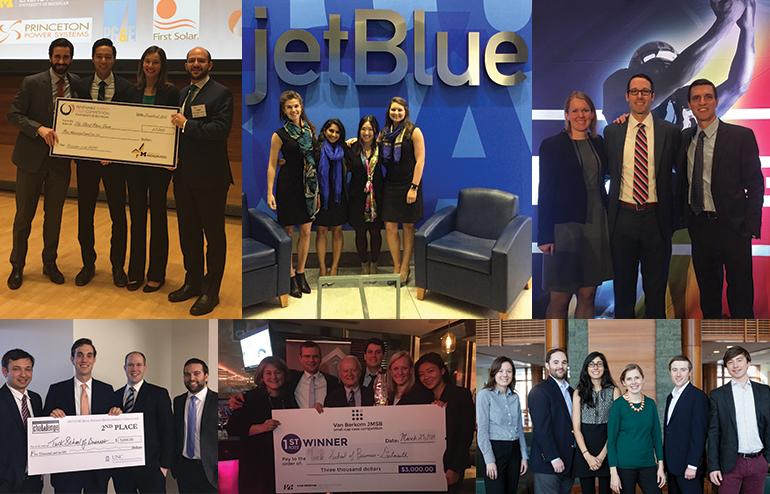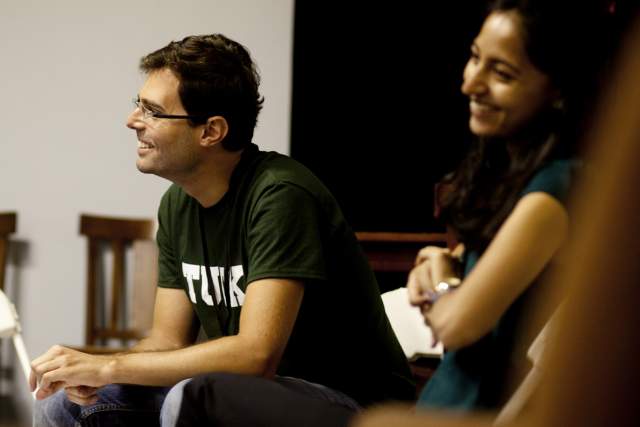High Marks for Students Competing in Annual Case Challenges
Tuck students put classroom knowledge to the test in MBA case competitions.

In recent months, Tuckies have seen success across a range of case competitions against top MBA programs.
When Charlie Humphreys T’17 first opened the prompt for the UNC Real Estate Development case competition, he braced himself for what he knew would be a tough next 72 hours.
“You just know that it’s going to be a grind for several days and you have to be in the right mindset,” says Humphreys. “But Tuck does a great job of preparing us for situations like this.”
During case competitions, like the UNC Challenge, students typically have just a few days to find innovative solutions to real-life business problems. They then present their results to a panel of judges, competing against other top business schools. The competitions provide an opportunity for students to stress test their interest in a particular industry, which was the case for Humphreys, who majored in building construction at Auburn University and plans to head into real estate investing and development after Tuck.
Humphreys and teammates Vijay Joshi T’17, Jason Millar T’17, and Tuck exchange student Suraj Rajasekharan were tasked with developing a comprehensive real estate development plan for a decommissioned Army fort in Atlanta, Georgia. The invite-only contest, hosted in February by the University of North Carolina Kenan-Flagler Business School, called for proposals to revitalize the fort into a residential area and asked teams how they would install apartment buildings, create green spaces, build retail stores, and more—all within a feasible timeline and budget. After submitting their plan, the team flew to Chapel Hill, where they presented over the course of two days.
“Up until we presented,” Joshi says, “we felt like we were kind of just there for the experience.”
They ended up with more than that: the team placed second, earning a $5,000 prize. The showing was all the more impressive given that many competitors came from programs specifically focused on real estate development.
The judges noted that the Tuck plan provided the most realistic options out of the 16 business schools that presented.
The team credits Professor John Vogel, associate faculty director of the Center for Business, Government & Society and an expert in real estate finance, with providing them a strong foundation of knowledge in the real estate arena that they brought to the competition. While professors aren’t allowed to advise on case competitions, Humphreys says that Vogel’s prior mentorship and teachings helped the team immensely.
“His interaction with us certainly doesn’t begin and end in the classroom,” says Humphreys. “He’s definitely more of a mentor, confidante, networker—all of the above—in helping us navigate the real estate landscape.”
The team’s showing, Humphreys says, illustrates how the Tuck curriculum helps prepare students for specialized projects, even when they might have less experience in certain areas, like real estate.
“It validates the Tuck approach,” says Humphreys.
And they’re not the only ones validating the Tuck approach. In recent months, Tuckies have seen success across a range of case competitions.

In this year’s Venture Capital Investment Competition, Lauren Alpeyrie T’17, Joe Henderson T’18, Emily Snyder T’17, Jeff Mullen T’17, Zoltan Czinkoczky T’18, took first place in the New England Finals held in Boston. The competition assesses how well competitors pick the right deal with real startups, put together a term sheet, and negotiate with entrepreneurs.
Meanwhile, Angel Fernandez Amores T’18, Kate Barnett T’18, Blair Crichton T’18, and Jon Ou T’18 travelled from Hanover to Ann Arbor for the Ross Renewable Energy Case Competition, hosted by the University of Michigan. There the team presented their plan to offer a combined hardware and software product that facilitates interaction between utilities and grid to better store energy. “We claimed third place, the highest showing for Tuck yet—a reflection of how energy at Tuck is growing in stature,” says Crichton.
At the Van Berkom JMSB small-cap case competition, Megan Farrell T’17, Andy Ladygin T’17, Milos Milosevic T’18, and Amy Shin T’18, took first place after showcasing their ability to analyze financial business cases, and develop strategic recommendations. The competition was held in Montreal, Canada. The competitors are scored based on how well teams propose investment strategies that reflect rigorous research, analysis, risk management, and selection processes that allow small-cap firms to maintain long-term growth.
Caroline Folmer T’18, Jon Torbett T’18, and Chris Trakimas T’18 represented Tuck at the 11th annual MIT Sloan Sports Analytics Conference in Boston, MA. Selected as finalists, the trio shared their vision for a comprehensive digital media strategy through the lens of the Houston Astros, netting them second place in the First Pitch Case Competition and an invitation to return for next year’s conference. “Being immersed in this competition really opened our eyes to the world of possibility that exists at the intersection of sports, business, and analytics,” says Torbett.
Stephiney Foley T’18, Amelia Russo T’18, Siena Hickey T’18, Dipti Badrinath T’18, and Sravya Yeleswarapu T’18 recently competed and won first place at the JetBlue Case Competition. Students leveraged lessons learned from Professor Ellie Kyung’s marketing course and presented to Robin Hayes, CEO of JetBlue, along with his executive team. The team recommended an innovative solution to millennial group travel.

